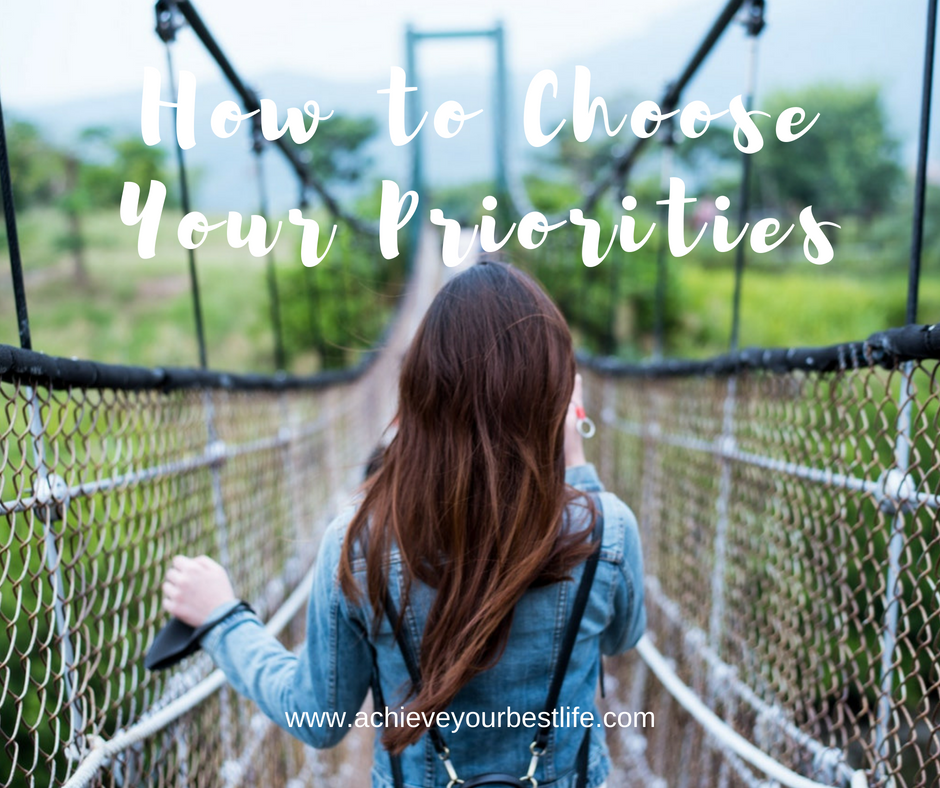
How To Choose Your Priorities
Do you ever wonder to yourself how to prioritise your workload? You think you’ve got it sorted, only to find that you get to the end of your day and feel like you haven’t really accomplished anything truly worthy of your time?
I’m sure that sounds familiar to a lot of people, myself included.
It’s far too easy to think we’re doing the right things, responding to others’ queries and emergencies, dipping back into the tasks that we’d highlighted earlier in the day as and when we can and taking the odd break to refuel and catch up on what’s going on in the world!
But that won’t necessarily get you where you want to go. Because prioritising is twofold. In the first instance you need to know what to prioritise and once you’ve established that, you need to make your choices a priority ahead of all the other things that are vying for your attention.
So in this first part of a two-part blog, we will find out how to identify your priorities and then in the second part, I show you methods to make sure you’re actually progressing these important-to-you tasks.
How To Identify Your Priorities
Most of us think this is obvious.
It’s obvious in the sense that if we get up in the morning and get on with something ‘meaningful’, then it must be a priority. But, this mostly will not be the case.
Sometimes we just pick up on where we left off, regardless of whether that’s a good use of our time or not. Other times, we just react to whatever comes our way (this is probably what we do a lot of the time!).
As long as the things we’re doing are within the realms of the everyday activities that we kind of expect to turn up, we just get on with it.
But these aren’t our priorities, they’re just ‘stuff’!
So what exactly are your personal priorities? Let’s find out.
Based on your day-to-day activities they could include any or all of the following:
• preparing children for school;
• cleaning, washing;
• going to work and reacting to the tasks that come your way;
• rushing between one task and another, never feeling that you have quite enough time to do anything properly;
• remembering birthdays, appointments and social commitments – for yourself and your family;
• cooking and cleaning up at the end of the day.
Now I’m not suggesting that any of these are unimportant, they can certainly be a foundation for keeping your days and weeks moving along, but, will they take you towards a life that you desire?
Probably not.
But here’s the simple but important question: do you actually know what you want?
I hear you…’that’s easy Nic, I want…
• A million £s/$s in the bank;
• I never want to have to work again;
• To spend more time with my family and friends;
• The soulmate of my dreams;
• A new house, car, clothes & holidays whenever I feel like it.’
Well it’s a great start and gives you some idea of what your real priorities are, but, if working towards one or all of these ‘wants’ doesn’t feature in your daily routine in one shape or another, then, clearly, it’s not currently a priority.
At least not for the moment! Because this is where you can really make a start on identifying what you real priorities are.
You know that you don’t light up when it’s time to wash the dishes and you’re not turned on by sitting in rush hour traffic every morning and evening, so if you’re ready to make a change, here’s a simple and practical exercise to help you identify your priorities.
Life Categories
Think of your life as split into a number of categories. Usually 8 – 10 categories is sufficient, but if you have more, group similar categories together.
Here are some examples I use regularly:
• Family / friends connection
• Relationship with life partner
• Finances
• Career
• Health
• Self-Care / Me-Time
• Hobbies, fun, adventure
• Personal Growth
• Contribution
• Spirituality
Take Score
Using each of these categories, or the ones that are meaningful to you, score your level of satisfaction with this life category between 1 and 10, where 1 = non-existent or terrible and 10 = amazing!
Don’t take too long over this, don’t second guess or analyse your score, just go with your gut feeling.
When you’re done, step away and go make yourself a drink and then come back.
Review Your Results
Your results should now be telling you where you can make the biggest difference in your life by making a change. This is represented by your lowest scored category(ies).
You probably already knew this instinctively, but it’s hard to back away from an honest assessment of what/where in your life needs most attention right now.
How does this make you feel? Are you scared, angry, disappointed, worried?
These are all natural and worthy emotions. Don’t be overwhelmed by them. Instead, thank yourself for finally surfacing your concerns.
Make Your Choice(s)
Here’s the fun part!
Choose 1 – 3 categories (usually the lowest scoring, but not always) where you’d like to ‘up’ your score over time.
For example, you might choose health (3); finances (3) and hobbies (4).
Don’t shy away from making the ‘difficult’ choice as this is where, if you apply a few positive, consistent actions, you will see the quickest improvements.
Choose Your Actions
Finally, it’s time to think of three things you could do to improve each of these categories. If you are relatively new to this, feeling somewhat scared or overwhelmed or are not confident on your abilities, then choose small actions.
Example:
Health
1. Eat a minimum of 3 pieces of fruit every day.
2. Take the children to the park and play with them.
3. Cook one healthy meal from scratch once per week.
Finances
1. Open all the financial mail that I’ve been ignoring.
2. Set a weekly grocery budget and stick to it.
3. Set up a savings plan and automate it.
Hobbies
1. Re-join my fitness/craft/reading group and attend every week.
2. Set aside a time every day to indulge my hobby (specify the time and duration).
3. Let others know that these are ‘my’ special times, so that I’m not expected to be somewhere else at that time.
These are just examples and you can plan more or less or different activities as it suits your circumstances. But, the important thing here is to notice that you have now set your priorities.
These are not once-in-a-while activities. These are actions that you must prioritise every day. They are a reflection of an improved lifestyle that you seek and therefore they take priority over washing dishes, cleaning others’ messes or dealing with others’ dramas.
Over To You!
Only you can make it happen, and it requires discipline and consistency. Others might be unhappy that you’re changing the status quo, but stick with it, because you know it’s for the greater good!
As with a lot of life improvement activities, the actual methods are simple and easy to do. The difficult part is making yourself do them!
In my next post I’ll write about how to incorporate these new priorities into your life, to ensure they are a priority!





[…] is the second of a two-part blog looking at prioritising. Last week we looked at how to figure out what are our real priorities. In this blog, we’ll be looking at how to actually use those findings to prioritise the most […]